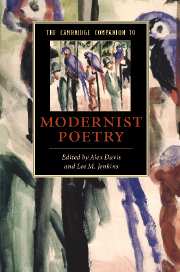13 - Modernist poetry and the canon
from Part III: - Receptions
Published online by Cambridge University Press: 28 November 2007
Summary
The process by which canonical reputations are made is more finely grained, subtly contextualised, and gradual, than many literary critics, with ideological axes to grind, acknowledge. The mechanisms of cultural influence that brought about the revolution of poetic taste associated with modernism were extremely complex and variegated: manifestoes, prefaces, introductions; vigorous and partisan debates in newspapers and literary magazines; selections in anthologies; pamphlets, essays and full-length studies; not forgetting the impact of modernist movements beyond the English-speaking world. The intellectual historian must seek to gauge the socioeconomic conditions in which modernist poetry was mediated and received, even the effects of intangibles (such as private conversation) that have now seeped into the shifting sands of canon formation. Taken together, attempts to reconstruct this intricate constellation of factors can leave accounts of the modernist canon a little under-explained. However, the main thread to follow does emerge clearly with the benefit of historical hindsight: it involves tracing the emergence of the new poetic in the avant-garde 'little magazines' established just before or during the First World War; the subsequent discussion of this poetry in the critical reviews of the interwar period; culminating in the institutional consolidation of a revolutionary poetic moment in university textbooks and syllabuses after the Second World War.
- Type
- Chapter
- Information
- The Cambridge Companion to Modernist Poetry , pp. 225 - 243Publisher: Cambridge University PressPrint publication year: 2007
- 3
- Cited by



